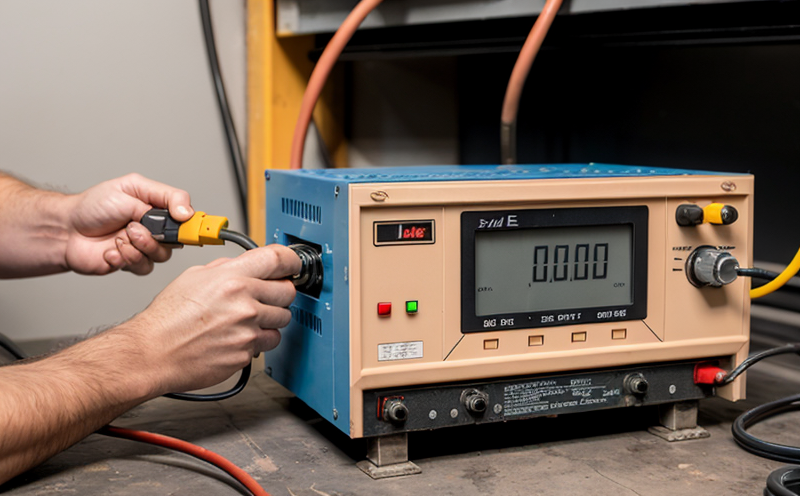ASTM F763 Die Interconnect Resistance Testing
The ASTM F763 standard is a critical method used to evaluate the interconnect resistance of die-level components in semiconductor and microchip manufacturing. This testing ensures that electrical connections between different layers within a chip are free from defects, which can lead to functional failures.
Die interconnects are essential for the proper functioning of semiconductors. They facilitate communication between various parts of the chip, ensuring data transfer and power distribution. Any resistance in these interconnects can disrupt this flow, leading to potential malfunctions or complete failure of the device. ASTM F763 provides a standardized approach to measure this resistance accurately.
The testing process involves several stages, starting with the preparation of the die samples. Typically, the dies are carefully extracted from their packages and placed on a suitable substrate for measurement. The interconnects are then electrically stimulated using controlled currents or voltages, and the resulting voltage drop across each interconnect is measured.
The ASTM F763 method specifies that tests should be conducted at room temperature to ensure consistent results. Additionally, the standard allows for testing under different conditions such as elevated temperatures if required by specific applications. This flexibility ensures that the test parameters align closely with real-world operating environments.
Once the measurements are taken, they need to be analyzed according to ASTM F763 criteria. The resistance values obtained should not exceed certain thresholds defined in the standard for each type of interconnect. These thresholds vary based on the technology node and the specific requirements set by the semiconductor manufacturer or industry standards.
The accuracy and precision of ASTM F763 testing are paramount to maintaining quality control throughout the manufacturing process. By adhering strictly to ASTM F763, manufacturers can identify issues early in the production cycle, allowing for timely corrections before the devices reach the market. This not only enhances product reliability but also reduces costs associated with warranty claims and customer dissatisfaction.
In summary, ASTM F763 Die Interconnect Resistance Testing plays a crucial role in ensuring that semiconductors function as intended. It helps prevent costly mistakes by providing reliable data about interconnect integrity, which is essential for maintaining high standards of quality and safety in electronic devices.
Why It Matters
The importance of ASTM F763 Die Interconnect Resistance Testing cannot be overstated. Ensuring the reliability and performance of semiconductors is crucial for various industries, including automotive, telecommunications, consumer electronics, and medical devices. When interconnects fail due to excessive resistance, it can lead to a range of problems from minor malfunctions to complete device failure.
For quality managers, ensuring compliance with ASTM F763 standards helps maintain consistent product quality across batches and manufacturing sites. This is particularly important in high-volume production environments where even small deviations could have significant impacts on overall yield rates.
Compliance officers benefit from ASTM F763 as it provides a clear framework for regulatory adherence, helping to avoid legal challenges related to product safety or performance claims. In R&D departments, this testing supports innovation by identifying weak points in new designs early enough to make necessary adjustments.
In procurement processes, specifying compliance with ASTM F763 ensures that suppliers deliver high-quality components that meet rigorous standards. This helps streamline supply chain management and reduces the risk of non-compliant parts entering the manufacturing process.
Environmental and Sustainability Contributions
Incorporating ASTM F763 Die Interconnect Resistance Testing into semiconductor production processes contributes positively to environmental sustainability by fostering more efficient use of resources. By reducing waste from faulty products early in the manufacturing process, companies can minimize energy consumption during production runs.
Additionally, ensuring that all components meet stringent quality standards reduces the likelihood of end-product failures requiring replacement or repair after deployment. This extends product lifecycles and promotes resource efficiency throughout the entire lifecycle of electronic devices.
The testing process itself also contributes to sustainability by providing valuable data that can be used to optimize manufacturing techniques further down the line. Engineers can use this information to refine processes, reducing material waste and improving overall productivity.
Use Cases and Application Examples
The ASTM F763 method finds extensive application in various sectors where reliability of electronic components is paramount. In automotive manufacturing, ensuring that the semiconductors used in safety-critical systems like braking or steering have low interconnect resistance is vital for preventing accidents caused by system failures.
In telecommunications, maintaining high-quality connections between different parts of network infrastructure ensures stable communication networks. Any disruption due to excessive resistance could lead to service outages affecting millions of users worldwide.
Consumer electronics benefit greatly from ASTM F763 compliance as well. Products like smartphones and laptops that rely heavily on microprocessors need reliable interconnects to ensure smooth operation without interruptions or crashes.
The medical device industry also relies on ASTM F763 for ensuring the safety of implantable devices such as pacemakers and hearing aids. Any resistance in their circuits could compromise patient health, making thorough testing critical before these devices are approved for use.





